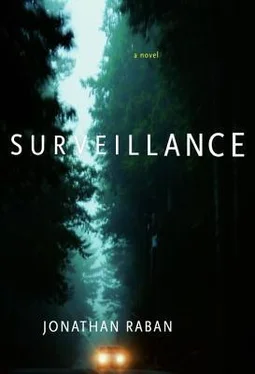Sitting alone at the bar, she picked at a sandwich and made notes on her morning’s reading. When she returned to the writers’ room, the guy was gone, having left his chair parked askew, along with a note on top of her book pile. “If you haven’t already, you should read Boy 381 by August Vanags — wonderful book, despite its crass bestsellerdom.” No signature, but she couldn’t complain. That was what writers were like — compulsive snoopers, shameless readers of other people’s letters.
It was getting close to three — and she had to pick up Alida at half-past — when she reached the last book in the pile and began to flip through. The Pianist, by Wladyslaw Szpilman. Polanski had made a movie of it, she remembered. “Even by the standards set by Holocaust memoirs, this book is a stunner.” So said the Seattle Weekly , quoted in the front, but Lucy was unstunned. She was wearying fast of World War II. The glass of pinot grigio she’d had at lunch didn’t help, and in the open cage of the writers’ room, the passing voices and regular inspections made her feel as if she were in the hospital.
Skimming, she was suddenly arrested by a paragraph on chapter 3. How very weird: Szpilman, like Augie, had seen Nazis throw an old man out of a window in a chair. It was all different, of course — both the wording and the location, with Augie in Lodz and Szpilman in Warsaw — yet both men had noted the peculiar detail of the body and the chair hitting the street separately and making different sounds.
Surely this was an eerie coincidence, but whatever it was — if anything at all — she had no time to ponder it now. Not trusting the sluggish elevators, she hurried down the stairwells, The Pianist in hand, followed by the staccato echo of her own footfalls. Pausing on the third floor to self-check the book out, she flew breathlessly on down to the bowels of the building, where the Spider was parked in the underground garage. When she switched on the ignition, it was already 3:29.
EMPLOYEE THEFT. That was the big downside to the parking business — attendants slipping five bucks here, ten bucks there, into their scumbag pockets. Every day, Charles O watched the revenue line on each of his lots. Over the last six weeks he figured he was short around $2,500, and he knew who’d taken it.
He’d thought his Mexicans were too afraid of him to steal, and he was surprised to find that the thief was Miguel. For the past couple weeks he’d switched the attendants around daily, lot to lot, and whichever lot Miguel was on came up short.
Today the kid was on the Broadway lot on Capitol Hill. Driving up Pike, listening with half an ear to the CD of Good to Great: Why Some Companies Make the Leap…and Others Don’t, Charles O enjoyed the thought of how he was going to teach Miguel a lesson so good he’d run all the way down to Tijuana and never come back. Plus he’d pay back every sorry cent he’d stole, and then some.
At the lot, he saw the kid was in the booth — shambling, and goofy-looking, even for a Mexican. The others treated him like their pet and were always giving him stuff — candy, cigarettes, Pacifico beer.
He lowered his window. “Hey, Miguel!” He could already see the fright in his eyes. “Want to take a ride?”
Stupid kid came straight around to the passenger side and opened the door. He was that goofy.
“Lock up. Put out the sign.”
He could hardly work the combination, he was so scared.
“Okay. Now get in. Move your ass.”
“ Si, Mr. Lee?”
Charles O said nothing, just drew away slowly, with the kid beside him and the CD still playing.
“Consider, for example, the buildup-breakthrough flywheel pattern in the evolution of Wal-Mart.”
“What you want, Mr. Lee?”
For answer, Charles O reached over and turned up the volume of the stereo.
“People think that Sam Walton just exploded onto the scene with his visionary idea for rural discount retailing, hitting breakthrough almost as a start-up company. But nothing could be further from the truth….”
He turned right, and left, and right again, then found a nice quiet place to park on the street, right beside the reservoir. He killed the ignition. Not looking at the kid, but staring straight ahead through the windshield into the drizzle, he said, “You been thieving.”
Big load of silence from the kid.
“Four thousand dollars. That’s some chunk of change, Miguel.”
“ Noooo …” A moan like a hooting owl in distant trees.
“How much you take?” He let himself sound fierce now, but quiet, his voice holding out the threat of much worse to come.
“ Dos mil cuatrocientos cincuenta, ” Miguel whispered.
“English! Say English!”
He was crying, shivering on the seat, and Charles O was afraid he was going to shit up that good new leather.
“English!”
“Two t’ousand…four hundert feefty…”
“Four thousand!”
“No — I swear of God.” He was making the cross sign on his chest.
“Fuckwit.”
“I got the money, Mr. Lee.”
“Thief!”
“I give you…”
“Why you steal from me?”
“ Mi padre. ” The kid’s face was coming all apart. He looked like a quaking lump of spongy gray tofu.
“What your daddy got to do with my money?”
“Hospital.” The word was a whimper.
“What hospital?”
“LA.”
“He die?”
“No, he got problem. With heart.”
Charles O had to laugh: this kid’s dad, going to a hospital in LA? He’d be ruined by the expense. “How much it cost?” he said, interested now.
“T’irty t’ousand, five hundert, forty. T’ree days intensive care.”
“How much you gotta pay?”
“Five t’ousand. I got brothers.”
Charles O saw the kid’s feet down in the footwell — nearly black with ingrained dirt, in flappy plastic sandals. They were five-dollar feet. “The shit you in, Miguel, no way you ever going to get out.”
The kid was weeping a fucking river now.
“What do you think I’m gonna do to you? You better think, Miguel.” He wasn’t looking at the kid, who was cowering back in the seat against the window.
“You a piece of garbage, you know that?”
“Yes, Mr. Lee.”
“The others. How much they take?”
“Maybe little bit. Sometimes.”
“Like Lazaro. Last week, how much?”
“Saturday. Take twenty-five.”
“Enrique?”
“Saturday also. He take forty.”
“Party time, huh?”
“No — for family. In Mexico. By wire.”
“You and me, Miguel, we’re gonna do a deal.”
“Deal?”
“You be my eyes, my ears. Lazaro takes five bucks, you tell me. I want to know when Enrique took his last crap? You tell me. You tell me every fucking thing I want to know, right? You say one word to them, I tell you this: I make you hate to be alive. You bullshit me, I fuck you up so good you think I am the king of hell.” He spoke softly, slowly, making sure the kid got every word. “ Everything. You tell me everything. ”
“I do that.” He was making the cross sign again.
“You be good boy, I pay for your daddy in the hospital. Twenty-six hundred plus what you stole, asshole.”
The broken kid was sobbing out his guts in heaving gasps and grunts.
“Shut the fuck up,” Charles O said, starting the engine.
Back at the lot, the kid stumbled, still sniveling, back to the booth.
“Remember: everything !”
He was in high good humor as he drove away, having handled it just right. Surprise was the key: surprise yourself, surprise others. That was a mark of the elite player. He switched on Good to Great.
Читать дальше












